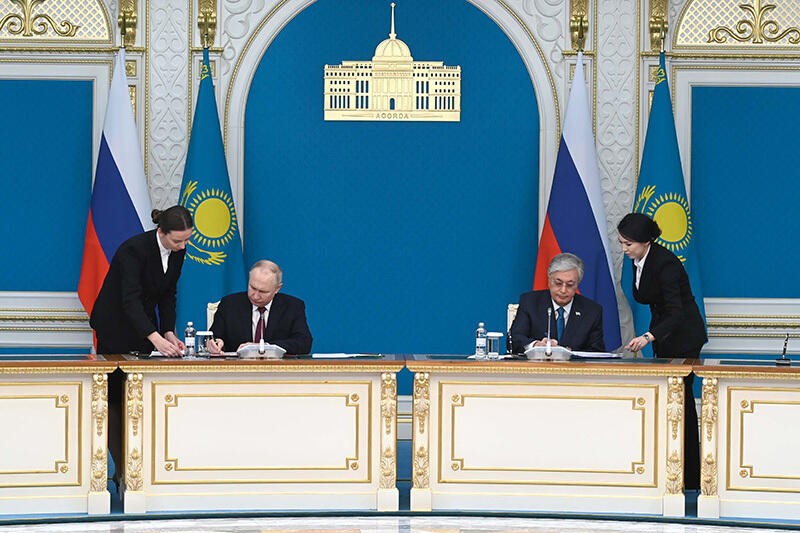
Kazakh and Russian Presidents Kassym-Jomart Tokayev and Vladimir Putin signed a number of documents following the talks on November 9, 2023. Source: Kaz Inform.
On November 9, Russia’s President Putin arrived in Astana to further his country’s bilateral relationship with Kazakhstan. His visit marked the tenth anniversary of both countries’ ratification of the agreement on good neighborliness, which proved to be a major theme of the meeting between the two leaders. After arriving in the country, Putin and Tokayev signed a series of agreements on energy cooperation and labor among other areas (Kazakhstan Today). Putin stated that the countries have maintained positive, friendly relations in accordance with the decade-old agreement and predicted further positive cooperation between both states (Kazakhstan Today). The leaders further discussed agricultural trade between the two states and the potential for increasing Russian gas exports to Kazakhstan in the near future, which currently sit at 3 billion cubic meters per year (Astana Times). It seems that in the lead-up to this meeting, President Tokayev attempted to downplay the relationship between Kazakhstan and Russia. In a piece published in Foreign Policy days before Putin’s arrival, the President credited his country with maintaining a balanced and neutral foreign policy that seeks cooperation with all states (Kaz Inform).
Kazakhstan’s Prime Minister Smailov visited Tashkent to plan further cooperation with Uzbek President Mirziyoyev to increase bilateral trade between the two states. The leaders announced that bilateral trade between the two states accounted for 70% of all trade in Central Asia – reaching $5 billion – they hoped to build further initiatives to raise that trade to $10 billion in the coming years (Kazakhstan Today). In this vein, Kazakhstan's Minister of Trade and Integration Arman Shakkaliev and Uzbekistan's Minister of Investment, Industry and Trade Laziz Kudratov subsequently signed an agreement to speed up the logistics and delivery of goods between the two states. This initiative includes the creation of an industrial cooperation center located near the Kazakh city Atameken and the Uzbek city Gulistan (Kazakhstan Today).
The Italian President Sergio Mattarella arrived in Tashkent to further his country’s bilateral relationship with Uzbekistan. Speaking with President Mirziyoyev, the leaders discussed improving cooperation in the arts, trade, and security cooperation. This cooperation includes people-to-people cooperation between Italian and Uzbek universities and the teaching of the Italian language at universities across Uzbekistan. President Mattarella further reiterated his country’s support for Uzbekistan to join the World Trade Organization (Uzbekistan Daily). As part of the official ceremony, the two leaders planted a tree at the official residence of the Uzbek President to signify the country’s growing relationship (Uzbekistan Daily).
The Economic Cooperation Organization (ECO), a regional development bloc composed of the five Central Asian states, Afghanistan, Turkey, Iran, Pakistan, and Azerbaijan met in Tashkent to discuss areas where regional cooperation could be increased. Ultimately, the member states seek to “improve the global profile” of the organization by developing deeper cooperation (Asia Plus). Of particular importance to the summit was the discussion of trade. With inter-bloc trade only accounting for about 8% of the countries’ total trade volume, President Mirziyoyev used the meeting to encourage the adoption of a trade agreement between member countries to ideally double the trade flow between member states by 2035 (KunUz). Other areas of cooperation discussed include energy tourism, environment, cultural and logistical cooperation. Of note, the Uzbek and Pakistani participants discussed the modernization of the Trans-Afghan railway to better integrate the country into the ECO (KunUZ). Prior to the meeting, Uzbek Railway authorities met with Taliban officials to discuss the further modernization of the railway (Tashkent Times).
UN Secretary-General Antonio Guterres proposed that Afghanistan should rejoin the international system as soon as possible. The UN Secretary’s statement urged that the international community develop a coherent engagement process to re-integrate Afghanistan as soon as possible, including milestones to measure progress on women’s rights and security cooperation, and that political reforms would be followed through on (Tolo News). In addition to releasing this statement, Guterres also appointed a new Deputy Special Representative for Afghanistan with the United Nations Assistance Mission in Afghanistan to better ensure that the Taliban is in compliance with the UN’s newly proposed road map to rejoining the international community (Ariana News).

